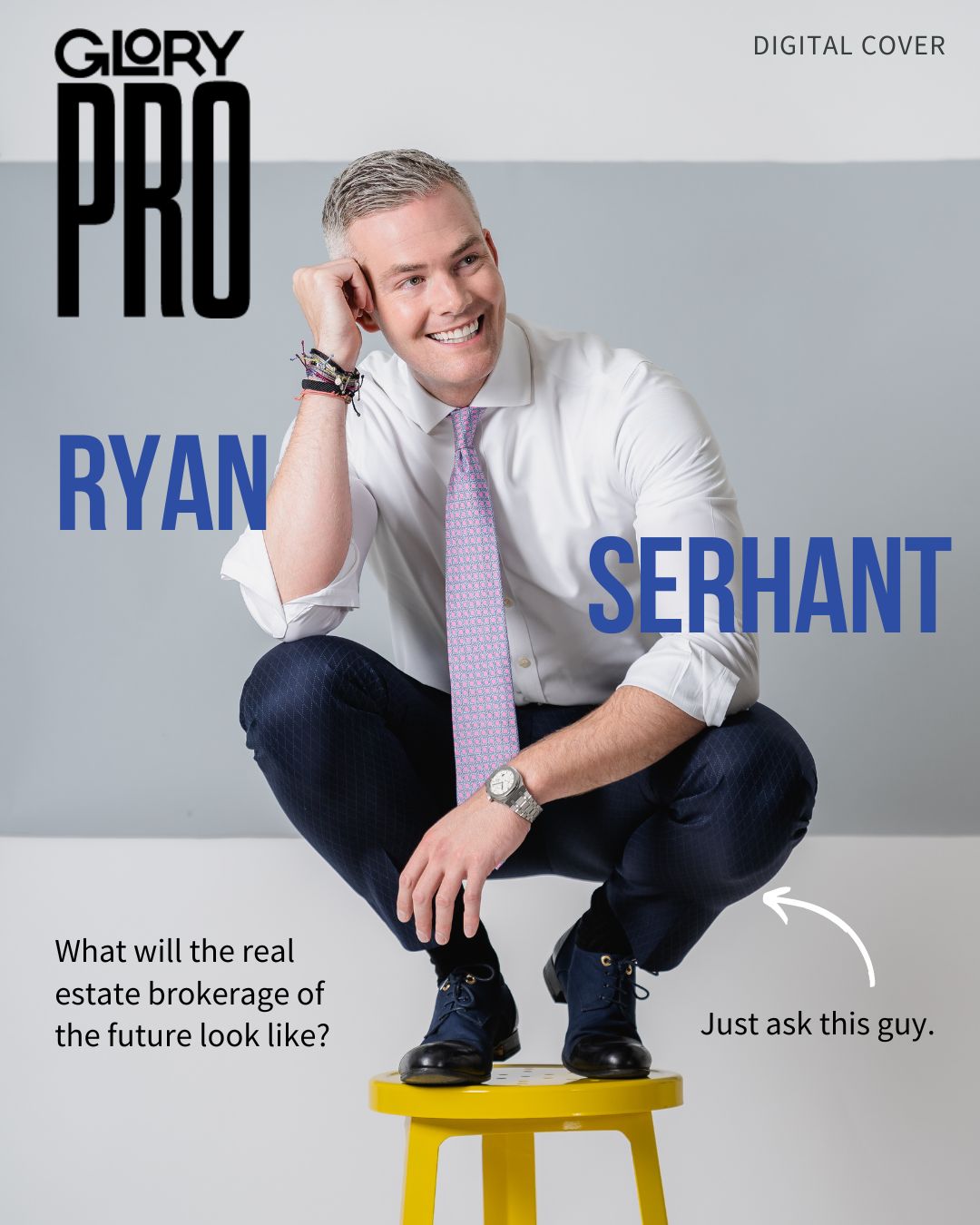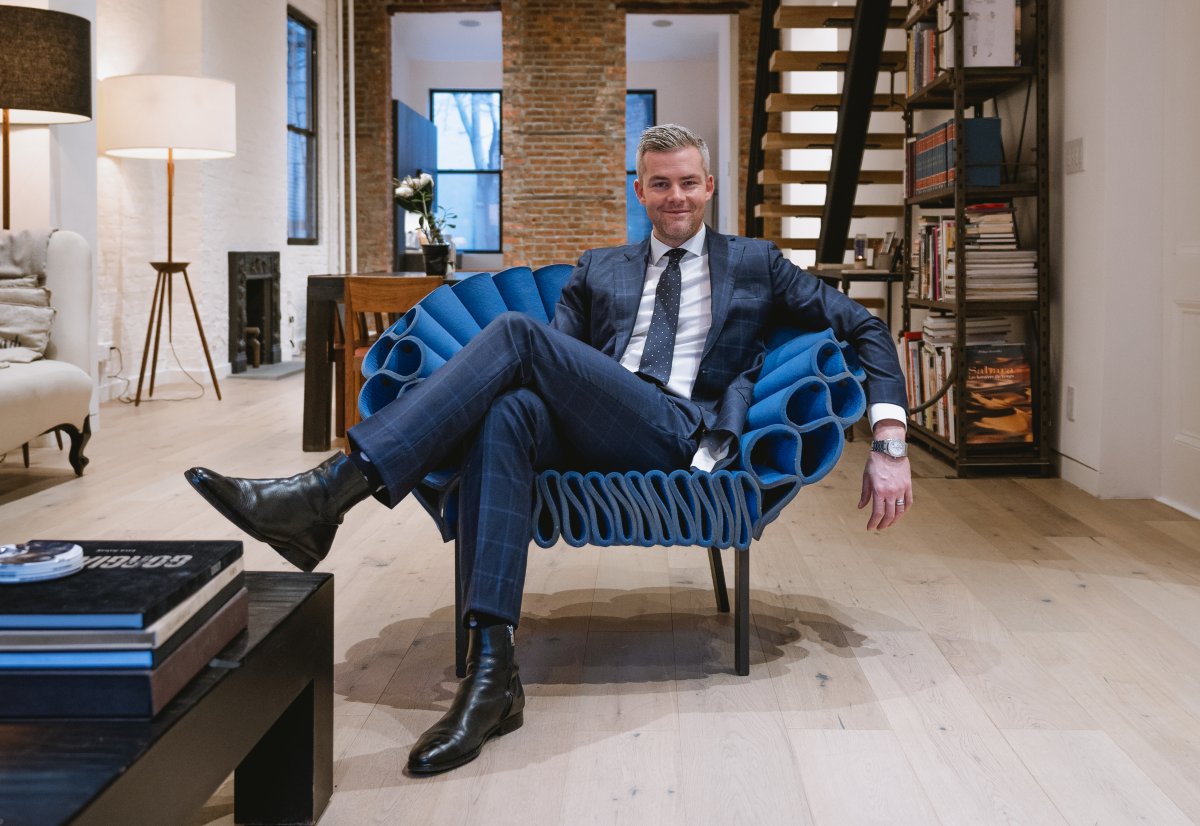Like any other industry that has remained largely unchanged in the way it operates and functions, it’s an exciting time to talk about real estate right now. Not just because of how hot this or that market is or rising interest rates, but because of the increasing impact that technology and innovation are having on the sector. Real estate agents are, by any measure, entrepreneurs. And entrepreneurs love to solve problems. Just ask Ryan Serhant.
Serhant made a mainstream name for himself thanks to his starring role in the Bravo series Million Dollar Listing New York and its spin-off Sell It Like Serhant. Yet as one of the world’s most successful real estate brokers, his credentials surpass the bright lights of the Bravo production. He’s also the founder of SERHANT., a vertically-integrated mega brokerage comprising an in-house film studio, technology platform, education arm, and marketing division. In his view, the future of real estate goes far beyond just selling a property. It’s about utilizing technology, creating media, and forging real human connections.
Today’s best entrepreneurs are not only the ones who are able to identify and tackle unique problems, they’re also the ones who understand the human element of them. Because understanding how to solve big challenges often requires us to understand each other—our wants, needs, fears, and joys. Through the lens of real estate, technology, and media, Serhant’s work is a master class in human connection and entrepreneurship.
For Glory Professional’s 2022 real estate digital cover story, the New York City-based realtor and best-selling author discusses his approach to real estate, how technology is impacting the sector, and what the brokerages of the future will look like. Also, what’s a low-rent habit? Listen to the Mission Critical podcast below or continue reading to find out.


On its website, your company SERHANT. bills itself as a “vertically-integrated mega brokerage.” What does the modern brokerage look like today in contrast to five or 10 years ago?
Ryan Serhant: Well, first, just remember that a brokerage is all about the people. Our customer is the real estate agent, and the real estate agent isn’t going anywhere until a house figures out how to sell itself to another house. So until that happens, and maybe it will, human beings (buyers and sellers) need other human beings (real estate agents) to help them buy and sell homes. The most valuable real estate brokerages of the next decade, two decades, or three decades are not going to be the ones that seek to replace agents. They’re going to be the ones that seek to empower them, in my opinion, through technology and through advances in marketing.
One of the first things I did when we set up this firm was I built out a full in-house production studio; we have an in-house film company. Our agents have access to some of the best content creation tools and platforms ever because we sell through content. Every single person is buying real estate or looking at real estate or viewing listings on their phones and on their computers. I want to be where they are all the time, which is in their hand. You want to be entertaining and engaging, and sell through content. Think about any major brands—Nike was content to commerce from the beginning. They were like, “Let’s put our shoes on athletes so that the consumer will see those shoes on those athletes on TV. That’s how we’re going to build our business.”
And that’s exactly what worked. It was product to content to commerce, and things haven’t changed. Now we just have TV in our phone, it’s called TikTok. And then we also have an incredible tech stack and awesome tools for our agents to be able to use that help differentiate them from the competition, and then some. Then, we round it all out with amazing training. We meet new agents through training, we build our referral source through training, and we make our current agents even better through consistent training. If you’re not investing back into yourself, then you can’t be upset when you do the same amount of business every single year over and over and over.


What are some of the most exciting innovations that you’re seeing happening in the real estate sector today? We’ve got artificial intelligence, NFTs, and more. How is the industry harnessing the potential of technology and entrepreneurship to really usher itself into this new era of real estate and business?
Ryan Serhant: I look at real estate agents not just as realtors; every successful agent is an entrepreneur. They’re all entrepreneurial salespeople and they’re all part of technically the gig economy. There’s 1.1 billion people in the gig economy right now. Some of them sell real estate, some of them sell t-shirts, some of them sell themselves. Think about anything that is sold by an individual who’s not paid an annual salary. That person is part of the gig economy. That person is an entrepreneur, whether they know it or not.
I think we seek to empower the entrepreneurial salesperson to do a lot. Our agents make money in multiple different ways. You can sell real estate, you can rent real estate, you can do speaking [opportunities], you can do social media endorsements, training, or even be a coach to an agent in Singapore who is just starting and looking how to sell the same way we do in the United States. There’s a lot of facets to what the entrepreneur can do in the real estate business.
I think the business as a whole is still trying to understand what to do with new technology. Real estate is static. The way you live in your home hasn’t really changed. You go there, eat, sleep, live. Now you might work there a little bit more but the house is the same. So the business is typically last to adapt to technological advances in the marketplace. I think something like NTRY, and this is why I flew up to Toronto to do it, is such an amazing invention as a [3D digital marketplace] for real estate. Agents, developers, and home sellers no longer have to wait for people to come to Toronto. They can bring Toronto to the people wherever you are. And it’s one thing to do it over video the way we do it, but it’s another thing to be able to showcase properties virtually in Toronto on your own from wherever you are in the world and have it look exactly like it does in real life with nothing left to the imagination because the scale is so perfect. That is a very cool and unique advance in technology in the way it affects real estate.
What kind of questions do you try to ask your clients in order to understand what they value and prioritize?
Ryan Serhant: The most important thing to figure out from a client isn’t just what they love, because a lot of people love the same things. Do you like views? Yeah. Light? Sure. Big windows? Yeah. Do you like gorgeous stone and new wood floor? Yeah. A lot of people have the same likes but not everyone has the same taste. What I really try to look for are fears. If you’re a seller or if you’re a buyer, what’s your fear? What are you afraid of if this doesn’t work out? You’re not hiring me to just show off your home like a tour guide or to show you around the city. If you’re looking to just look at apartments for the hell of it, I’m too busy for that. You’re hiring me to sell you something or to sell something for you.
So, what is your biggest fear if this doesn’t happen? And if there is nothing they’re afraid of, then that person isn’t a real buyer or seller. Everyone has something. Someone might say, “Well, rates are really, really rising and I want to lock in this rate now because I can only afford so much per month, and I want the most house that I can afford per month.” Okay, that’s a fear. Let’s move. These things kind of have a clock to them. Figure out what that fear is and you can do anything. That way, you’ll always consistently remind people of what their throughline is.


What is a fear that motivates you?
Ryan Serhant: I am afraid of leaving something on the table. I’m afraid of wasted potential. It’s my biggest fear—that I don’t do enough, that I haven’t squeezed enough out of the lemon. Life is so short, it’s so fleeting, which we saw during COVID. At any given moment, you can get hit by a car, get sick, or develop cancer, anything could happen. So how do I live the biggest, greatest, happiest life possible so that every day I wake up, I’m excited? How do I squeeze the most out of what life I have to live? That’s a big fear of mine.
In your book, you talk about “low rent habits.” What are you referring to specifically?
Ryan Serhant: I was referring to a lot but there are luxury habits, which are, for example, being really tired but having the habit of waking up at 5:00 AM. That is a habit that I’ve created to help dictate my future success because I know that if I get going two hours before the average competitor of mine, I have an additional two hours a day to succeed and get things done. That’s an additional 10 hours a week, two days a month, 20 days a year. Those are days that I have that I’m running ahead of you before you even start. That is a luxury habit.
A low rent habit is, for example, snoozing every day. A low rent habit is telling yourself you’re going to do something and not doing it. The only person you’re really hurting is yourself. A low rent habit is not pushing yourself to be comfortable with being uncomfortable. If you’re a salaried employee there’s only so much you can do unless you pick up some sort of side hustle, but entrepreneurs know the harder you work, the more money you can make. I was spending so much time commuting. I was in the subway all the time in New York City, losing cell service, and coming out and being hot and sweaty because we’d be stuck in subway traffic. That was a low rent habit because I was afraid to spend money to make money, and scared money doesn’t make any money. I took whatever money I had and I invested in a car and a driver that I couldn’t afford. I had no idea how I was going to pay that bill the next month. My luxury habit is, no matter what, I don’t play games on my phone. I don’t waste any time. When I’m in that car that I’m somehow going to figure out how to pay for, I am working. All I have to do is one extra deal a month to pay for this car and driver, and it’s going to completely free me up from ever having to think about commuting ever again. I’ll be able to do work at home, work in the car, work in the office, and around and around we go. It’s about breaking the low rent habits that are keeping you from getting to where you want to get to.


What is your mission at the end of the day?
Ryan Serhant: I want to change the face of sales forever. I remember getting into the real estate business at the end of 2008. it was embarrassing to tell people, one, that I was a realtor, and then two, that I was a salesperson. Would it have been embarrassing if I was selling $100 million houses at the time? No, but I wasn’t. For most people who think of selling and/or selling real estate as something that they don’t feel good about, it’s because we’ve been so accustomed to [believing that] unless you’re a doctor or an attorney or a banker, anything else that you do is secondary.
I think being an independent salesperson is probably one of the most freeing careers you can have and is something people should definitely train and learn for. Imagine not having to listen to anyone but yourself and just leading your own life? And the harder you work, the more money you get? Why does anyone go to school for 100 years to go out and have a boss? I don’t get it. The system has been set up to teach us that success comes with handcuffs and I just disagree. That’s my big mission in life.













